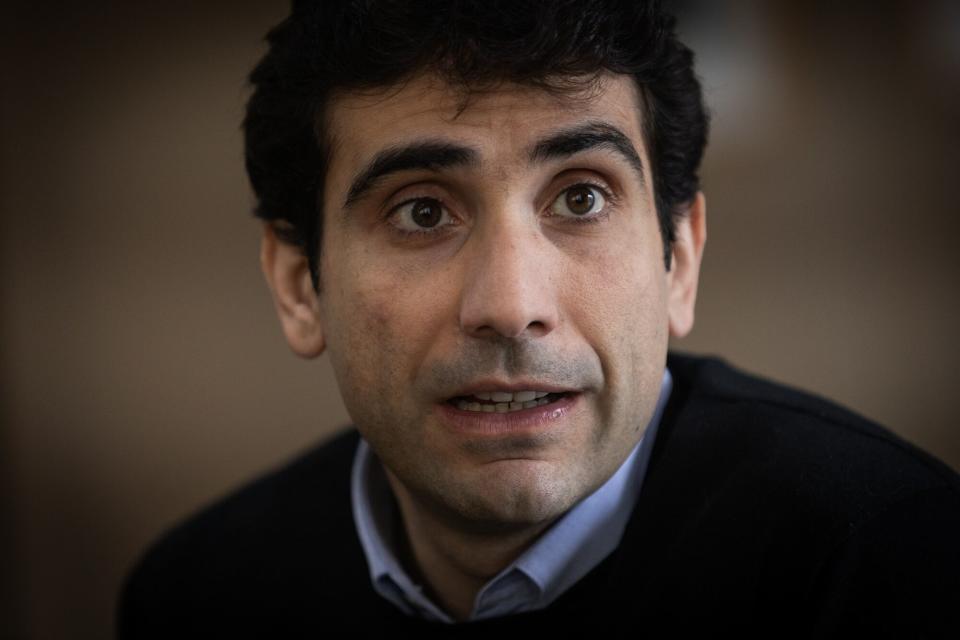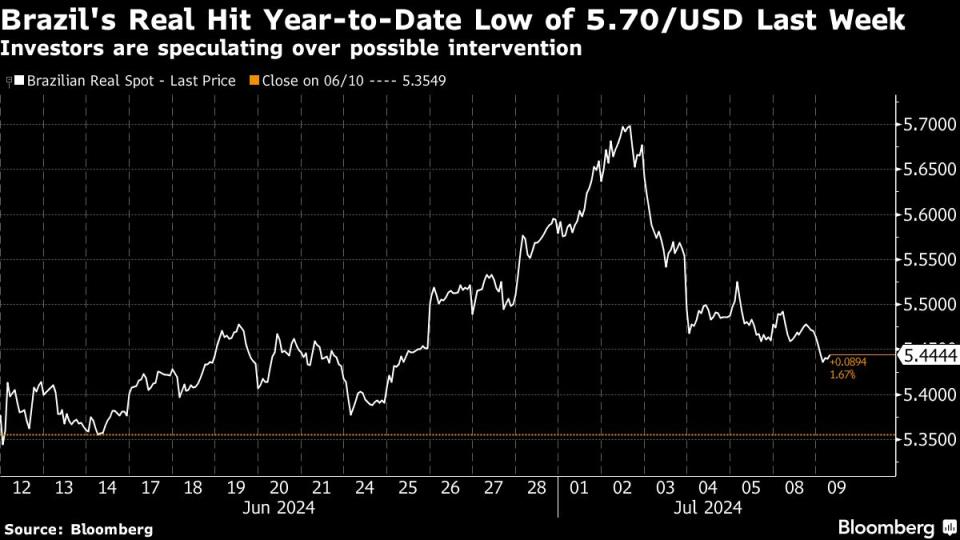Brazil Central Banker Signals High Bar for Currency Intervention
(Bloomberg) -- Brazil’s top decision-maker on currency intervention signaled he wouldn’t pull the trigger on any move to stem this year’s rout in the real without obtaining full support from the central bank board.
Most Read from Bloomberg
Saudis Warned G-7 Over Russia Seizures With Debt Sale Threat
The End of the Cheap Money Era Catches Up to Chelsea FC’s Owner
Gabriel Galipolo told investors in private meetings this month he would seek consensus from fellow bank directors before taking action in the foreign exchange market, according to four participants of those gatherings. The cautious stance seemed part of the monetary policy director’s strategy to avoid any appearance of being susceptible to political pressure at a delicate time for the institution, the people said, requesting anonymity to discuss the meetings.
Leia em Português.
Galipolo is President Luiz Inacio Lula da Silva’s likely pick to head the institution once Roberto Campos Neto’s term ends in December. That puts Galipolo in a difficult balancing act between a head of state who is demanding that policymakers combat what he sees as currency speculation and, on the other hand, investors who are uncomfortable with Lula’s growing influence on the bank. The government is also clamoring for lower interest rates, while markets are betting they will head in the opposite direction.
Brazil’s real has tumbled over 10% year-to-date, the biggest drop in emerging markets after the Argentine peso. Calls for central bank intervention came from Lula’s allies as the currency weakened sharply last week.
It then pared some of those losses when Lula refrained from commenting on the foreign exchange market and the government announced spending cuts.
“Traditionally any decisions to intervene would come in agreement with the governor,” said Luiz Fernando Figueiredo, a former central bank monetary policy director who is currently chairman at Jive Investments.
Traders have bristled at Lula’s criticism of monetary policy and delayed acceptance of spending reductions. “Our currency floats, and it’s now reacting to heightened uncertainties,” Figueiredo added. There have been “too many public speeches and interviews, escalating at every turn.”
Decisions to intervene in the currency market would come from Galipolo, who heads the central bank’s trading desks. For years, the institution’s governor would also need to sign off on any actions before their implementation.
Yet, as the Covid-19 pandemic disrupted domestic and global markets, the bank’s monetary policy director was granted autonomy to carry out currency operations using as much as 5% of Brazil’s international reserves, which currently stand near $360 billion. While that liberty remains in place today — though with a lower limit of 2.5% of reserves — Galipolo would still seek consent from other members of the bank’s top brass.
In public speeches, central bankers including Campos Neto and Galipolo have blamed “short-term noise” for the sell-off, pointing to uncertainties about the country’s fiscal and monetary future. They have stopped short of signaling any type of intervention in the foreign exchange market.
The central bank’s stance on the currency, in turn, has prompted Lula to allege that there’s a “game of speculation” that is “not normal.”
Policymakers frequently emphasize they don’t have an exchange rate target. But, as in many emerging markets, a sustained appreciation of the dollar can increase costs of imported goods, pressuring inflation. In the event of faltering liquidity or signs of market dysfunction, the central bank can auction new currency swap lines or intervene in the spot market by buying or selling dollars.
Brazil’s central bank declined to comment on this story.
Tensions between Lula and the bank are bound to rise after the board halted an almost yearlong easing cycle in June and gave no sign of resuming cuts. Galipolo joined the board’s unanimous vote to hold borrowing costs at 10.5% after having dissented in favor of a larger reduction in the prior gathering.
The government’s economic team interpreted Galipolo’s vote as a brave decision that reinforces his image of a technical policymaker, a person with knowledge of the matter said.
The stakes are high at a time when traders are already betting on rate increases this year. The concern is that investors could anticipate a spike in consumer prices because of the weaker real, and consequently lift their inflation estimates further above the bank’s 3% goal.
If such an increase persists in time, it could make another hiking cycle inevitable, according to Italo Abucater, head of foreign exchange at Tullett Prebon.
Amid a sharp depreciation of the real, the most practical and effective way to react would be by selling dollars, he said, adding that those sales would “create the environment for foreign investors to naturally bring inflows back.”
Most Read from Bloomberg Businessweek
At SpaceX, Elon Musk’s Own Brand of Cancel Culture Is Thriving
The First Porsche 911 Hybrid Is $165,000 Carrera GTS: Review
©2024 Bloomberg L.P.




